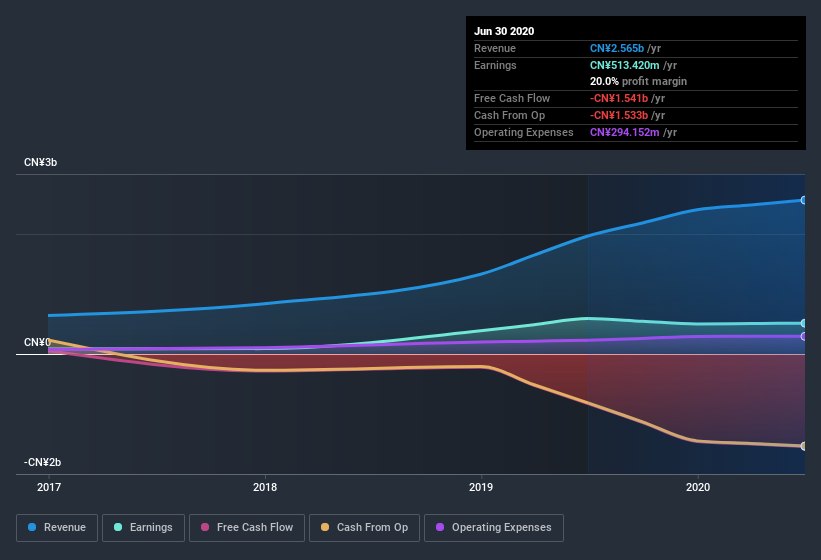- Hong Kong
- /
- Real Estate
- /
- SEHK:2231
Here's Why We Don't Think JY Grandmark Holdings's (HKG:2231) Statutory Earnings Reflect Its Underlying Earnings Potential

It might be old fashioned, but we really like to invest in companies that make a profit, each and every year. That said, the current statutory profit is not always a good guide to a company's underlying profitability. In this article, we'll look at how useful this year's statutory profit is, when analysing JY Grandmark Holdings (HKG:2231).
It's good to see that over the last twelve months JY Grandmark Holdings made a profit of CN¥513.4m on revenue of CN¥2.57b. In the chart below, you can see that its profit and revenue have both grown over the last three years, although its profit has slipped in the last twelve months.
See our latest analysis for JY Grandmark Holdings

Importantly, statutory profits are not always the best tool for understanding a company's true earnings power, so it's well worth examining profits in a little more detail. Today, we'll discuss JY Grandmark Holdings' free cashflow relative to its earnings, and consider what that tells us about the company. Note: we always recommend investors check balance sheet strength. Click here to be taken to our balance sheet analysis of JY Grandmark Holdings.
A Closer Look At JY Grandmark Holdings' Earnings
In high finance, the key ratio used to measure how well a company converts reported profits into free cash flow (FCF) is the accrual ratio (from cashflow). The accrual ratio subtracts the FCF from the profit for a given period, and divides the result by the average operating assets of the company over that time. This ratio tells us how much of a company's profit is not backed by free cashflow.
As a result, a negative accrual ratio is a positive for the company, and a positive accrual ratio is a negative. While having an accrual ratio above zero is of little concern, we do think it's worth noting when a company has a relatively high accrual ratio. Notably, there is some academic evidence that suggests that a high accrual ratio is a bad sign for near-term profits, generally speaking.
Over the twelve months to June 2020, JY Grandmark Holdings recorded an accrual ratio of 0.52. As a general rule, that bodes poorly for future profitability. And indeed, during the period the company didn't produce any free cash flow whatsoever. Even though it reported a profit of CN¥513.4m, a look at free cash flow indicates it actually burnt through CN¥1.5b in the last year. We also note that JY Grandmark Holdings' free cash flow was actually negative last year as well, so we could understand if shareholders were bothered by its outflow of CN¥1.5b.
Our Take On JY Grandmark Holdings' Profit Performance
As we discussed above, we think JY Grandmark Holdings' earnings were not supported by free cash flow, which might concern some investors. As a result, we think it may well be the case that JY Grandmark Holdings' underlying earnings power is lower than its statutory profit. In further bad news, its earnings per share decreased in the last year. At the end of the day, it's essential to consider more than just the factors above, if you want to understand the company properly. So if you'd like to dive deeper into this stock, it's crucial to consider any risks it's facing. Be aware that JY Grandmark Holdings is showing 4 warning signs in our investment analysis and 2 of those don't sit too well with us...
Today we've zoomed in on a single data point to better understand the nature of JY Grandmark Holdings' profit. But there is always more to discover if you are capable of focussing your mind on minutiae. Some people consider a high return on equity to be a good sign of a quality business. While it might take a little research on your behalf, you may find this free collection of companies boasting high return on equity, or this list of stocks that insiders are buying to be useful.
If you’re looking to trade JY Grandmark Holdings, open an account with the lowest-cost* platform trusted by professionals, Interactive Brokers. Their clients from over 200 countries and territories trade stocks, options, futures, forex, bonds and funds worldwide from a single integrated account. Promoted
If you're looking to trade JY Grandmark Holdings, open an account with the lowest-cost platform trusted by professionals, Interactive Brokers.
With clients in over 200 countries and territories, and access to 160 markets, IBKR lets you trade stocks, options, futures, forex, bonds and funds from a single integrated account.
Enjoy no hidden fees, no account minimums, and FX conversion rates as low as 0.03%, far better than what most brokers offer.
Sponsored ContentNew: Manage All Your Stock Portfolios in One Place
We've created the ultimate portfolio companion for stock investors, and it's free.
• Connect an unlimited number of Portfolios and see your total in one currency
• Be alerted to new Warning Signs or Risks via email or mobile
• Track the Fair Value of your stocks
This article by Simply Wall St is general in nature. It does not constitute a recommendation to buy or sell any stock, and does not take account of your objectives, or your financial situation. We aim to bring you long-term focused analysis driven by fundamental data. Note that our analysis may not factor in the latest price-sensitive company announcements or qualitative material. Simply Wall St has no position in any stocks mentioned.
*Interactive Brokers Rated Lowest Cost Broker by StockBrokers.com Annual Online Review 2020
Have feedback on this article? Concerned about the content? Get in touch with us directly. Alternatively, email editorial-team@simplywallst.com.
About SEHK:2231
JY Grandmark Holdings
An investment holding company, develops, operates, and provides property and property development services in the People's Republic of China.
Slight and slightly overvalued.
Market Insights
Community Narratives




